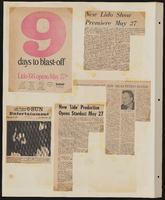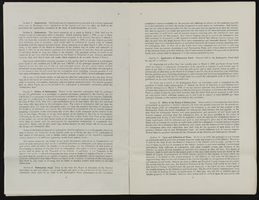Search the Special Collections and Archives Portal
Search Results
Stuart A. McCarthy Photograph Collection
Identifier
Abstract
The Stuart A. McCarthy Photograph Collection (approximately 1940-1949) consists of photographic prints and negatives of the Photo Mart storefront on Fremont Street as well as a view of the Golden Nugget, Eldorado Club, Hotel Apache, Boulder Club, and the Pioneer Club on Fremont Street in Las Vegas, Nevada.
Archival Collection

Transcript of interview with Renee Diamond by Barbara Tabach, November 20, 2014
Date
Archival Collection
Description
In this interview, Renee Diamond discusses coming to Las Vegas via Los Angeles, with her husband and children in the 1970s and getting involved in politics. She talks about her husband, Leo, and his business selling vinyl records in L.A., and her work in a doctor's office. Once in Las Vegas, the Diamonds joined Temple Beth Sholom and later Congregation Ner Tamid. Renee talks about her involvement in the political arena in southern Nevada, including the League of Women Voters.
Community activism and social justice rank high in the legacy of Renee Diamond. She often refers to herself as one of the last of the generation without college degrees that could make a difference in the politics of the state. When Renee, her husband Leo Diamond moved their family to Las Vegas from southern California, the energetic advocate Renee quickly plugged into the community. The word "No" was not part of her vocabulary. Among the many Jewish and secular activities the she engaged in were: the editorial board of the Jewish Reporter newspaper; Hadassah; Anti-Defamation League; Red Cross Board; State Museum Board to name a few. She remains a vibrant Democratic Party leader and served one term on the Nevada Assembly in 1989. She was on the front lines as a fierce and active supporter of Welfare Rights, Fair Housing and the Equal Rights Amendment. It is a life that included working alongside illustrious women and men of Southern Nevada history. A list that includes: Harriet Trudell, Ruby Duncan, Myrna Williams and Dorothy Eisenberg and many more mentioned here. Meanwhile she raised four children and enjoyed a loving 43-year marriage with Leo (aka "Uncle Leo") whose career included the popular Bingo Palace, Slots-A-Fun and Stations Casinos. During this oral history interview she recalls the Las Vegas that she moved to in 1972 and reflects on what attracted people here, ways to be part of the Jewish life which might even include a bowling league and how involvement in raising social awareness was a worthy investment of ones' time. This is a look at a woman who made a difference.
Text

Interview with Leslie Ray Hill, February 17, 2006
Date
Archival Collection
Description
Text

Transcript of interview with Todd S. Polikoff by Barbara Tabach, August 30, 2016
Date
Archival Collection
Description
In 2015, Todd S. Polikoff was named the President & Chief Executive Officer of the Jewish Federation of Las Vegas. (The organization is now known as Jewish Nevada). Todd is a graduate of Stockton University and earned his MBA at Cleveland State University. He has three children: Samuel, Shira and Jordan. Born in 1971 to a steelworker and hairdresser, Jack and Judy Polikoff, Todd grew up in Philadelphia, became a bar mitzvah there, and shocked his mother when he explained he was putting college on hold to move to Israel. In addition to stories about these life memories, Todd also traces his career path to decision-making to a meaningful trip to Moscow a where a defining moment helped him understand his own relationship with Judaism. To the time of this interview, Todd has invested over twenty years in leadership of Jewish Federation and AIPAC in states that include New Jersey, Delaware, Texas, Ohio and Nevada.
Text
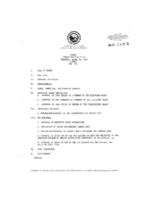
Meeting minutes for Consolidated Student Senate University of Nevada, Las Vegas, April 26, 1990
Date
Archival Collection
Description
Text
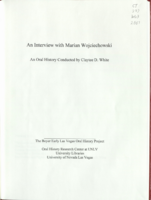
Transcript of interview with Marian Wojciechowski by Claytee White, June 16, 2009
Date
Archival Collection
Description
At age 95, Marian Wojciechowski recalls his personal story of being born a region called called Poland in 1914, just as World War I was beginning. This narrative gives special attention to his Polish background at a time when the country did not technically exist, and their language was forbidden. By the late 1930s and the dawning of World War II, Marian is a young man struggling to understand what is transpiring, but knowing that he must participate in the Polish underground resistance against the Germans His activism gets him arrested and sentenced to Auschwitz as a non-Jew and without penalty of death. He recalls the Gestapo beatings which have left him without feeling in his fingers and a loss of hearing. He shares historical perspectives of the war era, agricultural coops, goal of Germans to sell Jews to the United States and other countries, and a story about a woman who helped save 2500 Jewish children during war.
Text
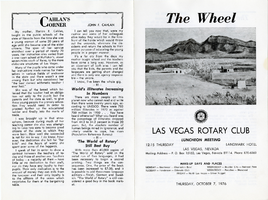
The Wheel Las Vegas Rotary Club newsletter, October 7, 1976
Date
Archival Collection
Description
Text
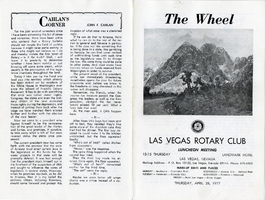
The Wheel Las Vegas Rotary Club newsletter, April 28, 1977
Date
Archival Collection
Description
Text

